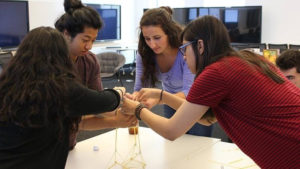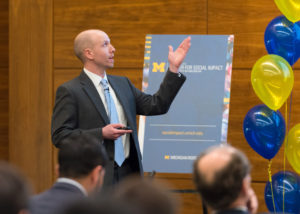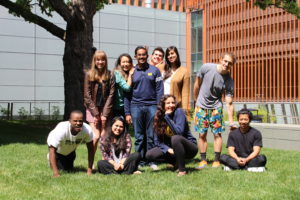What do Patagonia, Google and Disney have in common? Not only are they among the most reputable international companies, but they are leaders when it comes to corporate social responsibility initiatives.
Prior to the 2016 holiday outdoor apparel company Patagonia announced it would donate all of its Black Friday profits to charity and made a record-breaking $10 million. Google has been carbon neutral since 2007 and hit 100 percent renewable energy in 2017. Disney focuses on volunteerism with its “Give a Day, Get A Disney Day” program, which offers free tickets to a million people if they volunteer at an organization of their choice.
As consumers become more concerned with corporate social sustainability and social consciousness, businesses are implementing more initiatives in this area, making it important for tomorrow’s leaders to develop the skills needed to cultivate a career and practices in social impact.

The Change Agents participate in a skill building activity during orientation.
The Center for Social Impact, housed in the Ross School of Business, offers students the chance to learn this important aspect of business leadership.
“We work with students from all schools across campus,” said Glenn Bugala, Marketing Director at the center. “We’re proud of the fact that even though we’re based at Ross, our last social impact challenge engaged 14 schools across campus. We believe that working with purpose, in multidisciplinary and cross-sector opportunities can deliver the optimum social impact.”
So what is social impact?
The Center defines it as “a significant, positive change that addresses a pressing social challenge.” Yet it means something different to everyone, with MBA graduate Andrew Kelley describing it as when the people or community you work with were receptive to your efforts and appreciated them. For MBA/MPP student Karen Yocky, social impact addresses complex social issues, and involves collaboration across sectors to create unique solutions to social challenges.
The Center for Social Impact was a huge selling point of coming to the University of Michigan for Yocky. Within her first month on campus, she applied to become a member on the student advisory board, and ended up serving as a liaison between other schools and Ross to facilitate cross campus engagement.
“The board was the primary student voice of feedback for the center,” Yocky said. “It opened my eyes to the ability of business to drive social change, which was something I did not have exposure to coming from a nonprofit background.”
Kelley taught at an elementary school for eight years before making the decision to come to Ross.
“I used to think I was selling out by coming to business school,” Kelley said. “It felt like I was turning my back on a good cause where I could see the impact I was making in the kids and parents. But I realized I needed to go to business school if I wanted to pursue educational consulting or start my own charter school. I found out Ross had the Center for Social Impact and learned I could gain the skills I needed while staying connected to something I felt passionate about.”

Andrew Kelley presents at the Social Impact Challenge in 2016.
Kelley’s background as an elementary teacher made him interested in problems within the education industry. Through the center, Kelley served as a Board Fellow at Apple Playschools. Kelley was able to give his input and did a project on the side, in which he assisted with the organization’s finances and helped develop their budget.
Overall, one of the key issues he has noticed in education is that many people do not have the business skills needed to make their schools sustainable and profitable. Another problem he found is the lack of adoption of education technologies by teachers.
“No one has really executed on combining education and technology efficiently. There is a disconnect between brilliant innovative tech-focused people and getting their information into the hands of teachers so they can actually use it. Often you see a technology come in as a pilot, get used a little, and then fizzle out. I see myself potentially bridging that gap between technology and teachers. It is a matter of finding the right thing.”
Kelley now works as a management consultant at Deloitte, where he hopes to gain a diversity of experience so that he has a variety of career options in the future, whether it be running his own charter school or bridging the gap between technology and teachers. Kelley said he can see the school he used teach at through the windows of the office, and it serves as a reminder of his passion in education.
BBA alumnus Praveen Loganathan is also interested in education, specifically on redesigning the classroom and the way we teach. This passion for education is what led him to the Peace Corps, where he is now stationed in Botswana to design student friendly classroom.
“As an undergraduate student it can be hard to know what to look for in an organization,” Loganathan said. “Buzz words are thrown at you, but it’s hard to understand what matters to you. As an undergraduate you have to weigh location, salary, work environment, future career potential all as options. But as a society we forget to think about purpose and ethical limits.”
This concern is why he created the Change Agents Program through the center when he was an undergraduate at U-M. Through the program, undergraduate students are matched with regional social entrepreneurs to complete a fully-funded internship.

Praveen Loganathan with the Change Agents cohort
“The name Change Agents came from an unofficial club consisting of BBA Class of 2017 students who were frustrated about lack of social impact at the business school,” Loganathan said. “So we thereby named the program after this first group to continue a legacy. These alumni came back to mentor the students during the orientation and throughout the summer, once again filling the gap of lack of resources for BBA. All of this was possible because of their flexibility and willingness to address student problems.”
Through Change Agents, undergraduate students Avantika Tiwari and Richard Nguyen worked at SpellBound, a startup company that helps children cope and engage with their medical treatments by using augmented reality technology.
“I got to work closely with the CEO, Christina York, and she ran her company with energy which brought life to all the people around her,” Tiwari said. “It helped me realize I should go into an industry that reflects how I feel as a person.”
The students first went through a week-long orientation for Change Agents, doing various activities such as playing with children as a reminder to reconnect with their inner youth.
For Nguyen, this provided a valuable opportunity to connect with his classmates. It also exposed him to the concept of social impact and leading through empathy, which were both new ideas to him.
“Praveen starting the Change Agent program has really changed my perspective on what’s possible at Ross and career-wise,” Nguyen said. “Without this experience I don’t think I would’ve had the courage to break away from traditional careers.”
“The Center for Social Impact was one of the many resources I used to help find my purpose and what I value in an organization,” Loganathan said. “That’s why I joined the Peace Corps and have been working with schools in Botswana to design student friendly classroom and apply grassroots change management techniques to bring economic opportunities to others.”
The center offers other opportunities for students, including the Social Impact Challenge, a yearly competition where students attempt to solve a community problem. It also co-hosts the Michigan Business Challenge, Seigle Impact Track, awarding teams that deliver social or environmental impacts prize money for their venture.
“A lot of people have really benefited from the center, and I hope it continues to thrive and function long into the future,” Kelley said.


